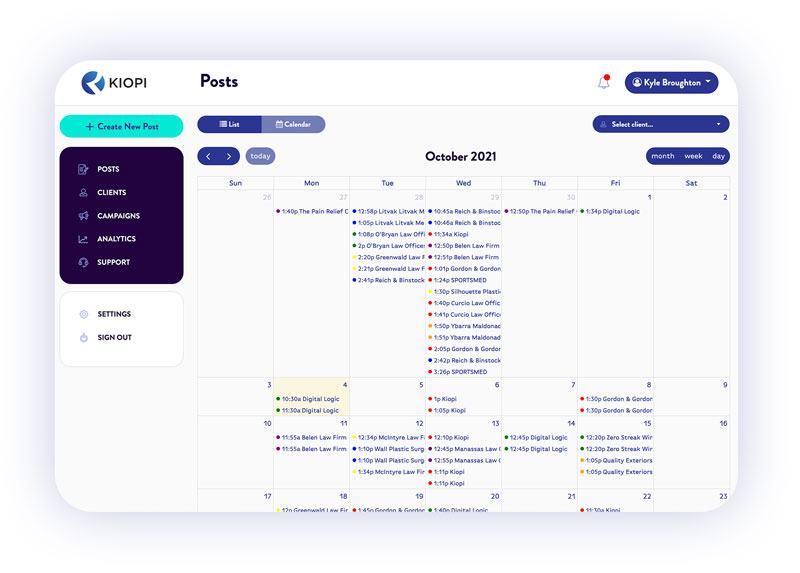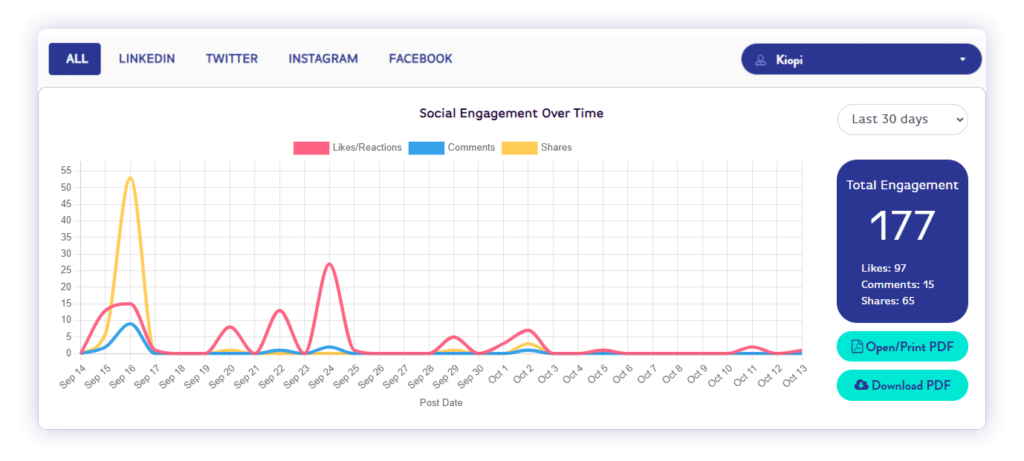Social Media Manager Contract
lauryn preston
Table of Contents
A social media manager contract is an essential agreement between a social media contractor and a client. Before work can begin for the client, both parties must agree upon and sign the social media management contract. These contracts are legally binding, which means that each party has the capability to pursue legal recourse if one party does not hold up their end of the contract.
If you’re unsure where to begin when drafting your social media manager contract, we’ll explain the key areas that should be included in your contract. There are also many contract templates online that you can use as a starting point.
Understanding the Importance of a Comprehensive Social Media Management Contract
A social media contract protects all parties involved in a business relationship. There is a lot that goes into social media for business, so contracts are extremely important.
Since there can be legal action if one party doesn’t fulfill their part, it’s extremely important to be detailed in every aspect of the contract.
Neither the client nor social media marketers should have questions regarding their duties and what’s expected of them. A social media management agreement should keep all parties on the same page.
A comprehensive social media management contract can help clients avoid stressing over what their social media marketer is supposed to provide. On the other hand, it can help the social media manager understand what’s expected of them from the client. When both parties know what they’re required to deliver, there should be no questions asked.

Benefits of Clear Agreements for Both Parties
When you outsource social media management, a social media manager contract will clarify what’s to be expected from both parties. The client will know what they can expect from their social media manager and vice versa based on the agreement.
A social media management agreement will clarify when clients can expect their content to be delivered. It provides a timeline for the social media manager to be held accountable so both parties are aware of the schedule of social media posts.
Probably the most critical aspect of a well-thought-out social media marketing agreement is that it defines the costs of services. When it comes time to cut the checks, the client will know what they owe, and the social media will know what to expect.
If social media advertising services are involved, here are some tips for social media package pricing.
What to Include in Your Social Media Manager Contract
By detailing the obligations of both parties, everyone can know what to expect regarding deadlines, social media posts, account access, and more. If the client or social media strategist doesn’t fulfill their obligations, either party can be held accountable due to the agreement.
Scope of Social Media Marketing Services
Defining the scope of work that the social media manager is responsible for and what the client can expect is probably one of the most critical aspects of social media contracts. Provide as much detail as possible when explaining tasks so that no one misunderstands their responsibilities. This can help prevent “scope creep,” which is the term used when an employee is constantly asked to do things outside of the scope of their services.
It’s also important to outline the due dates for one-time and/or recurring content. If you’re providing ongoing content, you can include that the content will be completed by the second Friday of every month.
Defining the Scope of Social Media Management Services
In this portion of the social media management contract, you’ll outline the services that your company will provide. This includes planning any or all social media marketing campaigns, the type of content supplied, how much content will be posted each week, and who is responsible for social listening, social media contests, and responding to messages and comments made by the accounts’ followers. Include social posts’ editing and approval process to avoid too much back and forth.
Learn more about social media management.
Specific Platforms and Accounts Covered
Create a list of all social media platforms and which ones the client has accounts with. Along with the list, provide a detailed explanation of what services will be provided on each account. Those services may not all be the same for every account, and it’s ok to be repetitive. You never want anyone to assume what to expect.
If the contract only covers services for Facebook and Instagram, include that in the agreement. If the client has a LinkedIn but they don’t want it managed by the social media manager, also include that. It’s always better to be more detailed than not provide enough information.
We outline new social media platforms for business. Just click the link!
Responsibilities and Deliverables
All the social media managers’ responsibilities and what they’re expected to deliver should be clearly stated. For example, if a company uses another social media agency for digital advertising, the contract should include that your company is not responsible for digital advertising.
Also, the contract should include what type of content and how much the client can expect, and when.
Outlining the Social Media Manager's Responsibilities
It’s essential to clearly communicate what the social media manager is responsible for regarding the social media accounts.
If the client expects them to respond to messages from followers immediately, it needs to be written out. And if social backlinking is part of your responsibilities, that should be included, as well.
Neither party should question what responsibilities the social media manager has.
Expected Deliverables and Performance Metrics
This is where the social media manager can explain what their client can expect from them regarding content for their social media platforms. This can include five videos a month, one daily post, etc.
There should also be a part of the contract that outlines the minimum performance metrics that the client can expect from the provided content. In social media, it’s almost impossible to predict results from campaigns. If the client understands this, the contract should reflect that there is an understanding that the social media management company cannot guarantee results.
On the other hand, if the client wishes to see certain results, they should specify those metrics. For example, if a client wants a certain return on ad spend, that needs to be specified.
Social Media Services Contract Duration
In this section of the social media management contract, you’ll want to provide a time frame for the contract. The contract should have the exact start and ending date if a client is hiring a freelance social media manager for a specific project. This way, no one is surprised when the job and contract end.
Setting the Contract Duration and Renewal Terms
If a client hires a social media management agency for ongoing social media marketing, the contract’s ending date can be omitted. It’s essential to include in social media marketing agreements when the contract renews and what the renewal terms are.
Clearly define how both parties can terminate the social media management contract. If the client is unhappy with their services, detail how they can end the agreement.
On the other hand, if the social media manager is having trouble with the client, such as them not paying, it should be clear how the management company can terminate the agreement.
If either party wants to terminate the relationship, having the time required to notify the other party before terminating the contract can be helpful, like a client must give 30 days’ notice before officially terminating the relationship. This allows both parties to anticipate the ending of the contract so they can make the proper plans.
Payment Terms for Services Provided
The payment terms will state the social media manager’s salary and/or how much the project will cost. If the contract is for ongoing social media management, note how much it costs monthly.
You can provide a total amount if the contract is for one project.
Need to know the social media manager average salary? Click the link to get more information!
Agreed Upon Payment Structure and Schedule
You’ll also need to provide how often payment is due and how. If the client wishes to pay via invoice, the contract should state how soon the invoice should be provided to the client and how long they have to pay it.
State when the invoices will be provided, like every Friday, and how often the social media manager will receive their payment.
Late Payment Policy and Additional Charges
Detail the amount of time a client has to make a payment or pay their invoice. For example, if clients receive an invoice for social media content, they have 15 days to pay it until it’s considered late.
You can also include in this section that if an invoice is over 60 days late, it’s grounds for termination.

Confidentiality and Non-Disclosure
When a client has information they wish to keep confidential, the social media management contract should include a confidentiality clause. However, even though a client may want to keep a specific part of their business confidential, it doesn’t mean that the social media manager can’t claim the client as one.
This section can also include how to handle confidential information like passwords, marketing insights, and products being developed.
If a client doesn’t want the business relationship to be public, they must include a non-disclosure agreement (NDA). For example, if the business has confidential information, like trade secrets, the client may require its social media managers to sign a non-disclosure agreement.
Intellectual Property Rights
Intellectual property is considered anything like designs, symbols, inventions, images, and everything else that can qualify as a “creation of the mind.” You’ll want to include a section about intellectual property rights both during and after the contract has ended.
Ownership and Usage of Created Content
When a client hires a social media management company to handle their social media marketing, they usually retain the right to any work created. The contract should clearly state who owns the intellectual property and how it can be used.
Rights to Use Client's Brand Assets and Materials
When dealing with a client’s brand and its materials, advice from a legal team can come in handy. Understanding what the client owns and how it can be used is important.
If you create content for a client and if that logo is exclusive to their business, does the client own it, or does the social media management company?
Ironing out these details regarding creative assets and understanding the applicable laws may take extra time, but it can save you from a lawsuit.
Content Approval Process
The content approval process should be clearly outlined and include deadlines. This can prevent clients and social media managers from spending too much time going back and forth. If the client wants the final say in approving the content created, it must be included in the social media management contract.
Other guidelines regarding content approval should be included, like if the client wants to have two people sign off on the content before it’s been approved or if they give the social media manager complete creative control.
Social Media Calendar
A social media calendar is vital to developing any social media strategy. It’s beneficial to both the client and the social media manager. A content calendar can show the client what is planned for the month ahead on all their social media platforms and help avoid confusion when they request certain content and haven’t seen it yet.

Social Media Calendar Expectations
Specify who can access the content calendar and what capabilities they have. For example, if you’re using the Kiopi content calendar, you can determine who has access to what and their capabilities.
If you just want your client to have the ability to view the calendar without making changes, these restrictions can be made.
Utilizing Kiopi's Social Media Calendar Tool
Kiopi’s social media calendar tool lets social media managers present an easy-to-understand plan for their clients. They can show what content will be posted, when, and on what platforms.
The social media posting app also allows multiple parties access, so if your client wants to keep up with the posted content, they can easily view it on the calendar.
Learn more about Kiopi’s social media calendar tools.
How Kiopi's Social Scheduling Tool Streamlines Posting
The Kiopi content calendar works seamlessly with the program scheduling tool. Social media managers can use the scheduling tool to post across all platforms while planning content months in advance.
The Kiopi content calendar and scheduling tool can help social media managers that are working with multiple clients and accounts. You can have one place to view, organize, schedule, and analyze your clients’ social media posts and data.
Social Media Analytics
Social media efforts can be wasted if the results from the content are not analyzed. The Kiopi analytics can be a major part of any client and social media marketing relationship. Clients always want to see results, which the Kiopi program can provide. You’ll see data from all platforms and how the posts performed, plus measured comments, likes, and shares results.
Data Reporting and Analysis Frequency
Using the Kiopi social media analytics tool, you’ll be able to provide data for clients that can help them understand how your marketing efforts are performing. When clients invest in social media management, they want to know they’re getting their money’s worth.
The Kiopi analytics tool can provide detailed reports over a period of time that increase your value as a social media marketer.
How Kiopi's Analytics Provide Insights for Better Strategies
Developing a social media marketing strategy usually takes a good bit of trial and error in the beginning as you learn about your client’s competitors and their target audience. As you continue posting content, you’ll be able to show your client how the marketing efforts are being received and what changes you think should be made.
This is also extremely helpful when working with stubborn clients who aren’t open to new strategies. The Kiopi analytics tool can show your client that the content isn’t performing as well as it could, giving you a leg up when introducing new strategies.
Learn more about Kiopi’s social media post service.
Crisis Management and Contingency Plans
Including a crisis management and contingency plan in your social media management contract will allow both you and your client to understand how any crisis will be handled.
Whether the problem is a negative comment, natural disaster, or faulty product, the crisis management and contingency plan can provide clients with peace of mind whenever anything negative arises.
Be sure to include a detailed plan on how the crisis will be handled on social media and what parties will be involved. Define what constitutes a crisis and problem and how each issue is dealt with.
Responding quickly to the crisis is key to any problem that arises on social media. A crisis management plan will ensure that any issue can be addressed immediately.
Client Communication and Reporting
An outlined client communication and reporting plan is important when developing a social media manager contract. This plan will help both parties understand the communication and reporting expectations. When clients invest in hiring someone like a social media manager, they want to trust that they’re actually doing what they’re being paid to.
Many clients aren’t familiar with social media marketing and may have many questions at the beginning of the client relationship. Outlining a clear communication and reporting schedule can help the social media manager from being inundated with questions while keeping the client at peace.

Regular Communication Channels and Frequency
Developing an open line of communication between the client and the social media manager is important to your marketing relationship. Scheduling regular meetings with the client and the social media management team helps keep everyone in the loop with how campaigns are performing and what improvements can be made. Social media marketers are typically off-site, so regular meetings can keep them in the loop with what’s going on at their client’s company as well.
In order to keep communication from getting out of hand, stating the frequency of meetings and streamlining communication can keep everyone on the same page and prevent the other party from becoming overwhelmed.
On the other hand, regular communication between parties also prevents the client or social media manager from “ghosting” the other party. While some clients or managers may communicate too frequently, others can be difficult to communicate with. Including when meetings should happen and how often ensures that an open line of communication can flow between both parties.
Detailed Reporting and Performance Updates
Social media management programs make providing reports and updates easier than ever. When clients hire social media managers, they leave the marketing work up to the experts so they can focus on their business duties. Providing reports and updates to clients can help them understand your marketing efforts and how their businesses’ content is performing.
Clients who don’t understand how social media works can get discouraged if they see their content isn’t performing as well as expected. Explaining how content is performing can help ease clients’ minds and help them understand the complicated world of social media marketing.
Learn more about social updates.
How Kiopi's Reporting Features Improve Transparency
Kiopi’s reporting tools give social media managers an easy way to clearly explain the backside of their client’s social media accounts. They can show precisely how posts performed by accessing likes, shares, comments, and more.
When planning content, the Kiopi reporting feature shows social media marketers what content performs well and what content doesn’t. The same can be said for clients when viewing the data on their social media. They can better understand how their business is performing on social media and know that they’re investing their money wisely with their social media management company.
Learn more about Kiopi’s social media analytics tools.
Indemnification
Including an indemnification clause is crucial for a social media management contract. You want to consider meeting with an attorney when drafting this agreement.
An indemnification clause holds the social media marketing agency liable for anything that goes wrong and removes the client from behind held responsible. For example, if the social media team commits false advertising or infringes a trademark, they’re legally responsible for the repercussions, and the client is not.
However, there is an option that makes the indemnification mutual in case the client is the one responsible for committing libel actions.
Protecting Both Parties from Legal Liabilities
Using a social media management contract template can be especially helpful when drafting sections that can have legal ramifications. Even paying reasonable attorneys fees can help both parties avoid unnecessary legal drama.
Outlining what parties can be held liable for helps both parties understand their legal responsibilities and the consequences if those are breached. It also protects your client’s confidential information.
Signatures and Agreement
The social media management contact will close with spaces for both parties to sign. Some clients prefer paper copies, but an electronic document and signature are just as binding in this digital age.
You’ll want to hold off on signing until after your client signs in case any changes need to be made.
Once both parties sign, you can start working on creating an excellent marketing campaign for your client’s business.
Kiopi Helps Social Media Managers Grow Their Business Relationships
Using a social media management program can increase your productivity and client portfolio by simplifying the process of managing multiple clients and their platforms. The analytics and data that the Kiopi program provides can help strengthen your relationship with your clients by showing them the success of your marketing efforts.
We’ve covered all the aspects that should be included in a social media contract and the importance of transparency and detail. However, if you’re still unsure about how to create your own, you can find a social media contract template online.
If you’re ready to add the Kiopi social media management tool to your marketing company, start your free 14-day trial today!
